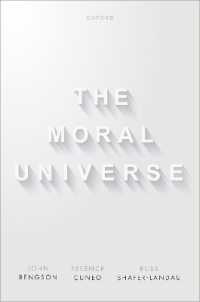- ホーム
- > 洋書
- > 英文書
- > Religion / Ethics
Full Description
"Fundamentalism" and "authoritarian secularism" are commonly perceived as the two mutually exclusive paradigms available to Muslim majority countries. Naser Ghobadzadeh highlights the recent political developments that have challenged this perception. He points to mainstream Islamist groups, such as the Muslim Brotherhood and Al-Nahda, that have adopted a distinctly secular-democratic approach to the state re-building process. Their success or failure in transitioning to democracy remains to be seen, but the political position these Islamic groups have carved out suggests the viability of a third way.
Ghobadzadeh examines the case of Iran, which has a unique history with respect to the relationship of religion and politics. The country has been subject to both authoritarian secularization and authoritarian Islamization over the last nine decades. While politico-religious discourse in Iran is articulated in response to the Islamic state, it also bears the scars of Iran's history of authoritarian secularizationthe legacy of the Pahlavi regime. Ghobadzadeh conceptualizes this politico-religious discourse as religious secularity. He uses this apparent oxymoron to describe the Islamic quest for a democratic secular state.
Offering a new reading of Shiite political theology, Ghobadzadeh argues that the Islamic state is detrimental to religion while a secular state can be compatible with it. Going further, he contends that maintaining a secular government is crucial to the cultivation of genuine religious conviction. This path-breaking analysis of Islamic history challenges existing scholarship, and gives voice to a unique, and optimistic Islamist perspective on what the future of Middle Eastern politics could be.
Contents
Acknowledgments ; Introduction ; Chapter One: Shiite Discourses on Sovereignty ; Chapter Two: Seeding Secularity The Rise of a Jurisprudential State ; Chapter Three: Religious Rationale for Separation ; Chapter Four: Political Construction of Clericalism ; Chapter Five: Clerics against Clericalism ; Chapter Six: Clerical Hegemony Contradictions and Paradoxes ; Conclusion ; Bibliography ; Notes







